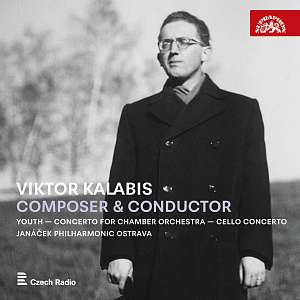
VIKTOR KALABIS
COMPOSER & CONDUCTOR


Supraphon’s 2013 album Symphonies & Concertos, mapping mature and late music by Viktor Kalabis (1923–2006), has met with an enthusiastic international response (Gramophone Choice / Reissue of the Month, Choc de Classica). Much of the Czech composer’s early output is, however, yet to be discovered. The present Supraphon recording, containing three pieces dating from between 1948 and 1951, attests to the young Kalabis’s striking maturity. Youthful energy and intimations of future weighty profundity characterise Kalabis’s early music. The album Viktor Kalabis: Composer & Conductor, to be released by Supraphon on 22 March 2024, contains recordings he made in the first half of the 1980s, conducting the Janáček Philharmonic Ostrava.
In the Concerto for Orchestra, Op. 3 (1948), he paid tribute to Igor Stravinsky, a great idol of his, with the concerto grosso form and instrumentation referencing Dumbarton Oaks. The impressive brief overture Youth, Op. 7 (1950), demonstrates Kalabis’s great mastery of large symphony orchestra. The surprising dark colours in the work may reflect the difficult period of the Communist dictatorship’s ascent. The neo-folk Concerto for Cello and Orchestra, Op. 8 (1951), reveals Kalabis’s diverse inspirations (Dvořák, Bartók, Hindemith and late symphonic Martinů).
“Viktor Kalabis was a truly significant figure in several aspects. Firstly, throughout his life he wittingly cultivated the legacy of the finest composers of the first half of the 20th century, thus demonstrating the brilliant continuity of European, including Czech, music, which, far from being a concluded past, keeps existing. I deem that to a bold extension of understanding 20th–century music, which after WWII has been viewed as having started anew, from an illusory ‘year zero’. This continuity is clearly attested to particularly by the early Kalabis pieces featured on the new Supraphon album. Secondly, the composer’s importance rests in his having created music encompassing the two most crucial genres of the past two centuries – the symphony and chamber music, especially the string quartet. In this regard, Kalabis even linked up to the three major Viennese Classicism composers, Haydn, Mozart and Beethoven. And thirdly, Kalabis always focused on the main theme of his intellectual life, advocacy of inner human freedom and dignity under two totalitarian regimes. Only after the second of them had crumbled did Kalabis’s work begin to be perceived in its entirety, and thus construed as a whole,” says the musicologist Aleš Březina, President of the Board of the Viktor Kalabis and Zuzana Růžičková Foundation, supporting performers and scholars interested in Kalabis’s oeuvre.